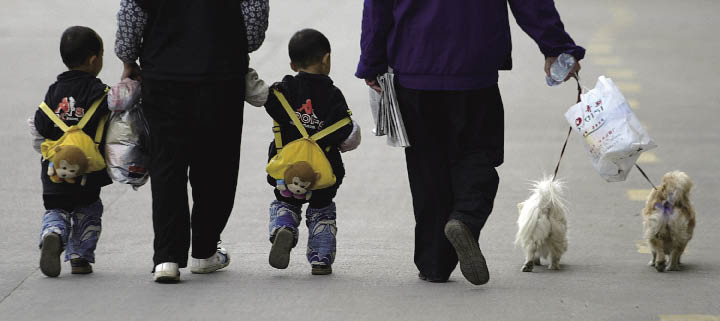| The One Child Recommended - Not Compulsive - Policy
By SHUANG SHUANG
XIAO Li was born in 1980 when China's family planning policy was in full swing. As his mother had borne Xiao Li's brother three years earlier, his coming was, as he describes it, "an inopportune event." Giving birth to a second son lost Xiao Li's mother her job as doctor at the local county hospital.
 |
| An old couple in Chongqing taking their twin grandsons and a pair of dogs home, April 10, 2007. | Thankless Work
Xiao Li grew up in rural Hebei Province in the home of his maternal grandparents. Fines for second births were common in the village. One of his playmates was named "Eight Thousand" after the RMB 8,000 penalty his parents had to pay when he was born. Xiao Li recalls another family who, "sold off their household possessions to pay the second-child fine."
China experienced a baby boom in the mid-1960s. By 1970 the population had grown from the 500 million of 1949 to 800 million. The family planning policy of the late 1970s initially stipulated two children for each couple, but the Chinese government hardened its approach and altered the policy to a stringent one child per family, and used punitive administrative and economic measures to enforce the stipulation.
Monetary penalties were the most common disincentive to having more than one child. The walls of certain villages bore the warning: "Families that have a second child risk bankruptcy." The average fine for a second birth in the 1980s, when the annual per capita rural income (as calculated by the Ministry of Agriculture) was RMB 437, was RMB 10,000, according to demographer He Yafu. These exorbitant penalties impoverished some families, forcing them to move away to cities to earn a living sufficient to survive while paying off their huge debt.
Bringing the policy into effect in rural areas, with its deep-rooted traditions of childbearing and family lineage, was difficult, especially when the newly adopted rural economic reforms accentuated the obvious advantages of family-based farm labor. The absence of legal regulatory processes also spawned corruption and arbitrary fines. Rural inhabitants were consequently hostile to the policy, and birth control workers responsible for enforcing the one-child rule were commonly despised and reviled.
The policy encountered less opposition in urban areas, where both state employees and their families enjoyed social welfare. As urbanites were anxious to retain their jobs and all the accompanying benefits, they were more willing to conform.
In 2007, Yang Zhongchen, a farmer from rural Hebei, filed a lawsuit for compensation from family planning administrators at the local population and family planning bureau. Yang's wife had fallen pregnant in the year 2000 before the couple registered their marriage. Lacking the required birth permit, she had been forced to have a termination. By the time the case came to court, the birth permit system had been revoked in many places. But as Sun Maohang, the couple's lawyer, remarked, "No matter what the outcome, the lawsuit's acceptance and entry into the judiciary process constitutes legal progress."
Fairness and Justice for All
China enforced the country's first Population and Family Planning Law in 2002 as a solution to the problem of "power abuse by family planning workers and grassroots cadres in certain places, which necessitates legal instruments to regularize and restrict the actions of policy enforcers," according to Zhang Weiqing, then minister of the National Family Planning Commission. The law prohibits compulsory abortion and stipulates that family planning policy practices should not violate personal or property rights. As Vice Chairwoman Gu Xiulian of the Standing Committee of the National People's Congress stated in 2005: "The Chinese government is against any form of coercive and punitive action and forbids compulsory abortion and conception control."
| 